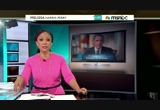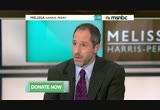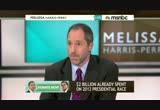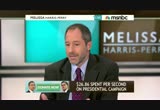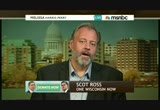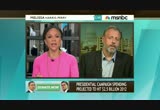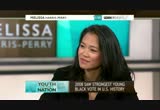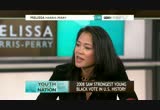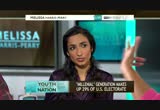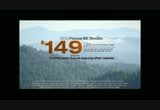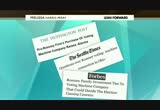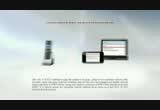tv Melissa Harris- Perry MSNBC October 27, 2012 7:00am-9:00am PDT
7:00 am
this morning, my question. what is the strategy for election protection? plus, even if this scares you, you've got to accept it. our national fate rests in the hands of the young. and i've been a college professor for 15 years, but it turns out i know very little about college. but first, how much money would it take to buy your vote? good morning. i'm melissa harris-perry. before we get to politics this morning, i want to give you a quick update on sandy. the storm which overnight had been downgraded to tropical storm status is now back to hurricane-force winds. sandy will continue moving away from the northwest this morning and move parallel to the southeast coast of the united states through the weekend. serious and life-threatening weather conditions are expected
7:01 am
as early as tomorrow evening from outer banks to new england. new york, pennsylvania, maryland, virginia and north carolina plus the district of column yeah have already declared states of emergency. a tropical storm warning is in effect for parts of florida. we'll have more updates on sandy later in the program. right now i want to turn to politics. this, my friends, is $26.86. $26.86, not a hunl amount of money. certainly not enough for a spiffy new iphone 5. it will get you plenty of itunes downloads. not enough to take the whole family to the movies, but you could probably treat yourself to lunch at applebee's. imagine that $26.86 compounded every second. that is $1,611.60 a minute. that's $96,696 an hour or $2.3 million a day.
7:02 am
suddenly $26.86 doesn't seem so modest because $26.86 is how much both candidates combined are spending every second of every day this election cycle which is why on thursday, we cross a milestone in american politics. a big fat $2 billion milestone. the 2012 presidential election has officially become the billion dollar race twice. in the first two weeks of this month alone, president obama, the dnc and related fund-raising committees have raked in $88.8 million. not to be out done, mitt romney's fund-raising machine and his friends rauld in $111.8 million. what's all that cash buying? the candidates hope these dollars are going to buy your votes. in these ninl super heated days of campaigning, they are raining down e-mails on their donor lifts, multiple times every day. each message promises for a small donation, maybe 26 bucks,
7:03 am
you can help to ensure victory for your presidential candidate. for a few dollars more, maybe 86 cents you can ensure he has a helpful majority in congress, too. what a bargain! government for sale for the low, low price of $26.86 a second. of course, these dollars don't buy votes directly, they buy fancy rallies, irritating phone calls, direct mailing and tv ads. 900,000 ads have aired in the general election race for the president so far. in the first weeks of this month, that means 112,000 pro president obama ads blanketed the air adds and 97,000 pro romney ads reached your television sets. a 45% increase from the number that ran in 2008. for the next ten days, 43,000 political ads will air each day. but with numbers this big, nearly $27 a second, maybe we've reached saturation.
7:04 am
if you've seen 42,000 ads, do 43,000 really make a difference? just ask coke and pepsi if they think advertising dollars matter. money can change preferences which is just what the campaigns are hoping what will happen in ohio where, let's face it, votes are definitely worth more. $177 million have been poured into the buckeye state to impress dwing voters in dayton, columbus and cincinnati. ohio has overtaken florida as the state that has seen the most money in the presidential election. this week ohio went platinum, $175 million in spending in a seven difficult period. polls show much of the lech tart is concerned about the new heights of giving and expending. but who can hear their concern over the sound of all that cash raining down. today adjusted for inflation the most expensive race per vote is the 1896 presidential race of
7:05 am
the two williams. karl rove's hero mark hannah helped william mckinley garner 51% of the vote by outspending william jennings bryant, smushing that william into the ground. all these years later we still haven't topped hannah. one political scientists at the university of denver spent time to calculate exactly how much each vote cost. in 1896 each vote was worth approximately $15 of today's money. 116 years after the record was set, get ready for a new one, because 2012 looks to be the year when campaigns and outside groups combined spend more than $25 per american voter. $25 a voter, 26 bucks a second, it all leads me to ask, is your vote for sale. if it is, what does it cost our democracy? at the table ben cohen, co-founder of none other than ben & jerry's ice cream and head
7:06 am
stam per, devoted to bringing awareness to money in politics. valer valerie core, david donnelly, executive director of the public campaign action fund and lesley sanchez, author of "you've come a long way baby." thanks to my panel for being here this morning. as we were doing these calculations, i just kept thinking, i cannot believe that it is this expensive. are people's votes simply for sale? >> i don't think they're for sale. i think the amount of money in politician is disgusting to a lot of people. they don't want to see excessive campaign spending, particularly all these advertising raining down in the campaign. i do think that they're more worried about where the money is coming from because it's not coming from them. it's coming from very wealthy interests, those that can give $25 per person which is what you can give to candidate, those are not average americans.
7:07 am
it's a very small slice of the american public. when you see facts like this past week when chevron dumped $2.5 million from its corporate treasuries into super pac, then americans wonder whether elections is for sale, whether government is for sale rather than their votes. >> these numbers for me were just stunning. opensecrets.org say given almost -- we just passed the $2 billion that president barack obama is the candidate who has drawn the most shadow money, this kind of quiet money. supporters, shadow money supporters, $1.1 million. shadow money opposition to the president $74.1 million. and it's shadow money. >> with the amount of money in elections has always been troubling, but the massive amount of spending from corporate and special interest groups, this shadow money in this election is completely
7:08 am
demoralizing to me. to bring this issue home, i think about my neighborhood in new haven -- >> we're having a mic problem. we're going to come back with you. i want these insights, but i want my audience to be able to hear it. >> ben, you're a businessman and have a social vision for the world. but this now is a critical issue for you. talk to me about -- valerie at the beginning was saying it's demoralizing to think about how much money is in the system. what's the work you're doing around this? >> we're trying to get money out of politics in general, especially big money out of politics. i don't think the issue is the huge total amount of money that's in politics. i think the issue is that the major contributions to these candidates and pacs are coming from corporations that are doing it because they have a particular agenda. it's companying out of the corporate treasury because there's a corporate purpose.
7:09 am
and the corporate purpose is they want legislation passed that's going to benefit their own narrow self-interests. that's what's screwing up the country. >> leslie, i think that's what fuels anxiety producing across parties. you and i come from different ideological positions. that doesn't mean we wouldn't both be very concerned about the idea, not only that votes are for sale, but ultimately that the candidates are for sale and that will make a difference in how they govern. >> i think two parts to that. one, this is not a cottage industry where we're talking about company finance, political ads. it is basically massively running off the rails. there's a lot of public scrutiny on the right and the lecht. you've lookedality everybody from senator mccain who has talked about campaign finance reform. the problem is it's political gamesmanship as opposed to actual reform. you talk about decision closure. there's a lot of people when you look at big labor that would be
7:10 am
under the threshold. i'm saying without sparking the debate, which i'm sure we'll have, is that people want to know where the dollars are coming from, who sin vested but on both sides. you can't hide it or mask it. >> when we come back, we'll talk about where exactly is the money coming from. i want to talk and citizens united and 501(c)(4)s as well. valley, i want to fix your mic and get you back in. when we're back, i want to ask about karl rove, the man with the cash, way more than $26, making it rain on the campaign. i have a cold... i took dayquil, but i still have a runny nose. [ male announcer ] dayquil doesn't treat that. huh? [ male announcer ] alka-seltzer plus rushes relief to all your worst cold symptoms, plus it relieves your runny nose. [ sighs ] thank you! [ male announcer ] you're welcome. that's the cold truth! [ male announcer ] you're welcome. you know it can be hard to lbreathe, and how that feels.e,
7:11 am
copd includes chronic bronchitis and emphysema. spiriva helps control my copd symptoms by keeping my airways open for 24 hours. plus, it reduces copd flare-ups. spiriva is the only once-daily inhaled copd maintenance treatment that does both. spiriva handihaler tiotropium bromide inhalation powder does not replace fast-acting inhalers for sudden symptoms. tell your doctor if you have kidney problems, glaucoma, trouble urinating, or an enlarged prostate. these may worsen with spiriva. discuss all medicines you take, even eye drops. stop taking spiriva and seek immediate medical help if your breathing suddenly worsens, your throat or tongue swells, you get hives, vision changes or eye pain, or problems passing urine. other side effects include dry mouth and constipation. nothing can reverse copd. spiriva helps me breathe better. (blowing sound) ask your doctor about spiriva.
7:14 am
to spend more on television and radio ads in the presidential race than any other in recent weeks. of course i'm talking about karl rove. his two groups, american crossroads and crossroads gps have spent more on television and radio ads in the presidential race than any other super pac or advocacy group in recent weeks. since september 10th, put together, rove's groups have spent $47.4 million through october 18th. just this week, american crossroads unleashed $12.6 million for swing state media blitz, including the return of clint eastwood, political operative to our air waves. >> obama's second term would be a rerun of the first and our country can't survive that. we need someone to turn it around fast. that man is mitt romney. there's not much time left and the future of our country is at stake. >> at least the president gets to appear as himself rather than an empty chair. rove is betting on this kind of
7:15 am
spending. people don't spend money to advise unless they think it's going to make a difference. talk about 501(c)(4)s that citizens united unleashed on this campaign. >> 501(c)(4) is another word for a charity. it's a social welfare organization that can spend money on lobbying or on influencing elections. it can only spend up half to this money influencing elections. in the citizens united case back in 2010, allowed those organizations to take it a step further and use corporate money to spend directly in the middle of elections, corporate and union money to say vote for or vote against. now, this money is not new in politics. it just exploded. the court decision wiped away the gray area in our campaign finance law. so now there are no limits to what outside groups can do. and so what we're seeing now is an explosion in that area. although it's a problem that existed before citizens united. >> i want to pick up on what
7:16 am
leslie was saying earlier. the 501(c)(3)s -- these are all named obviously for the codes, for the tax codes. the 501(c)(3)s where we actually see an enormous number of progressive action going on in these non-profits, they are barred. they can't write these checks. so to me that's where it feels like there is part of this critical asymmetry occurring. is that right, the difference between the threes and fours. >> there are ones that aren't ideological at all. sometimes the group that benefits a local library is a 501(c)(3). it's charitable organization. a c-4 can spend in elections. because there are so many wealthy donors and corporations on the right, this election cycle to defeat president obama, they are pouring money into
7:17 am
these groups that don't have disclose -- >> that $74 million spent in opposition to the president with only $5.1 million spent in opposition to governor romney, it isn't because of a law issue, it's because of an actual resource. >> we saw the same disparate in 2004 when president bush and there was a very strong opposition to president bush. >> we say if you want to know, follow the money. you a strategy for following the money. >> we brought all the money. >> i'm looking at the table now which looks like apparently we're going to go down to florida to a strip club afterward. that's not what's going on here. explain what's going on with this money on the table. >> you know, corporations and the wealthiest .01% of the country are making their money talk by giving gobs of its to politicians expecting favors in return. the problem is that that
7:18 am
overshadows the voice of regular people and the stamp stampede campaign is about regular people being able to make their money talk by stamping messages on it. this is a message about stamping money out of politics to pass an amendment to the constitution to say that corporations are not people and money is not free speech. >> before you can go spend your dollars at your local business, then you first stamp it and it's your message to say stamp the money out of politics. i have a brilliant producer, and i bought for her a stamp that says "it's all bs." maybe she can put that on her money. while ben & jerry's is over here stamping the dollar bills which i hope don't ever end up in anyone's g string, valerie, talk to me about what you were saying earlier about how this feels like maybe a way to start bringing regular people's voices. >> i am going to take these
7:19 am
dollars, ben, back to new haven in my neighborhood where i talk to folks -- >> you got it. spread them around. spread them around. >> what i love about this is it really shows what's at stake here. the folks i talk to back at home, these are largely low-income, african-american, latino families. they're just trying to make ends meet. they don't have much access to political power. our election season is the one time where they feel they can have a say in our democracy. today our enormous disparities are reinforced by our political disparities. >> that's supposed to be the one moment that's maybe moving out. i ought to be able to say every voice counts equally in the ballot box. is that changing? i was looking at the amount of outside spending. if you look at the center for responsive politics about shadow money, you just see that this is new, right?
7:20 am
yes, there's always been money in politics, but look at the explosion of it over the course of the past couple of election cycles, in particular 2012. lesley, do ordinary people still have a voice when there's this much loud spending going on? >> i think you mentioned a point about the 915,000 political ads. what wasn't added to that is it's a 44% increase from 2008. you wake up in the morning, your twitter feed is full of political ads. the truth is, all your mailings and everything else, i do want to reiterate it is on both sides. there's transparency that the public skepticism about this is because for many years there was not balance anywhere those dollars were. now i think the healthy part of this conversation is we're going to step out of this election and need to talk about american democracy, the influences that are in it. and see if there is a fair way
7:21 am
to have disclosure because people want authenticity and transparency. >> i want to talk about exactly this issue in the state of wisconsin as soon as we come back. beyond campaign cash, there is a lot of money influencing so-called grassroots mobilization efforts. oh, these dollars. all right, when we come back, more on that. ♪ in america today we're running out of a vital resource we need
7:24 am
what we need are people prepared for the careers of our new economy. by 2025 we could have 20 million jobs without enough college graduates to fill them. that's why at devry university, we're teaming up with companies like cisco to help make sure everyone's ready with the know how we need for a new tomorrow. [ male announcer ] make sure america's ready. make sure you're ready. at devry.edu/knowhow. ♪ between 13,000 statewide congressional and municipal races, not to mention the presidential race, $9.8 billion will be spent this year, $9.8 billion. what? and that is just the money to get into office. what about after they get elected? what about the money that floods into the decision making policy process and legislation writing. joining me now from madison, wisconsin is scott ross of one wisconsin now who has been
7:25 am
looking at this very issue coming from his back yard to influence policy decisions across the country. nice to have you, scott. >> melissa, a real pleasure to be here. thank you. >> talk to me about the bradley foundation. i've spent the last couple days reading everything about them. what i found so shocking is they're bigger than koch, but not a name we know in national politics. >> a lot of people think the most destructive right wing elements out of wisconsin might be scott walker's agenda and paul ryan. it turns out it's this little building in milwaukee, wisconsin, that houses the bradley foundation. thanks to intrepid reporting last weyear from the milwaukee journal sent nenl we know that probably since supreme court declared george bush the victor
7:26 am
of the election, they've spent nearly $1 billion in to push forward a right-wing agenda. that includes funding think tanks, hoover, manhattan institute, to funding the activities on the ground of voter suppression and activities that take away the right of the people to exercise that sacred right of the franchise. they are massive. >> scot, i want to pause. i've been framing this as kind of buying your vote through advertising and that kind of thing. but what i found fascinating about the bradley foundation is they lay the intellectual justification for a variety of conservative policy positions. they fund research. they also fund the arts and things that are kind of community-based within wisconsin and milwaukee. but that idea of laying the intellectual framework suggests to me that this is not easily rooted out, for example, with new legislation. >> no. and the thing is, melissa, they have spent half a billion
7:27 am
dollars. 60% of that is for organizations outside the state of wisconsin. they create science, junk science in universities and these think tanks that is the moral justification for these harsh restrictive conservative policies which take away corporate accountability, which privatize our schools. that's one of their massive endeavors is the privatization of private schools. they've moved now into funding organizations about propaganda to say there's massive voter fraud and justify the activities in polling places on election days. that includes, melissa, a contribution to true the vote which ended up being returned because true the vote didn't have its 501(c)(3) status, but true the vote and organizations that are working with true the vote. hundreds and hundreds of thousands of dollars to organizations working with true the vote to put a million poll workers in election precincts on election day. >> i want to bring in valerie
7:28 am
quickly because she's been making the point about on voting day it should be that every vote counts the same. if it's not advertising, if they're putting voter suppression action in the field, that strikes me as particularly troubling. >> yes. what's especially enraging is that in this time of economic depression so economic waste is being poured into these campaigns. the majority is being spent on negative ads. it would be one thing if this money was deepening political discourse. it's actually cheapening it. they're organizing faith leaders to stand up to money and politics and with ben organizing folks in colorado to pull for a constitutional amendment to overturn citizens united. >> there's some kind of solution do this? >> there are a variety of different solutions. i don't think there's any one silver bullet. i think we need to work on a variety of different fronts. just as important as getting the money out of politics, we need to think about policies that bring the people back in, we
7:29 am
can't simply think of the problem as one that reduces money in politics. we need to incentivize more participation. through small donor matching programs like in new york city and a variety of states around the country, right now there's a big campaign in new york state to try to get public financing passed. governor cuomo is a big supporter. there's federal legislation. the real challenge is a political one, not pool see one. there are solutions to these issues. the real question is whether we can build the political will to adopt anything that puts some of the sanity back into our political system. >> scott, the argument here is it's not just money out. it's got to be people in. wisconsin has a long tradition of organizing, of populism. is wisconsin the place where we can start looking for solutions for money out, people in? >> certainly we saw in the last two years in wisconsin with the agenda of governor walker and the attacks on workers here and the wisconsin way of life, that people have mobilized and are funding against it.
7:30 am
in wisconsin we were able to get the billboards taken down, the voter suppression billboards that were funded. so there is a great and massive mobilization. certainly they have unmatched forces, forces that i want to point out are tax deductible. so when corporations give money to these organizations, they can get a tax break out of it. in fact, they ran $4 million worth of television ads, bradley founded organizations here in the state of wisconsin, the first ads run to promote walker's agenda during the recall were 501(c)(3) tax deductible ads paid for by the americans for prosperity foundation. a wisconsin-based group almost holy funded by bradley foundation. now those similar ads are running nationally. the americans for prosperity foundation and citizens against government waste, another group that gets money from the bradley foundation are running those ads with china supposedly in 2030 talking about how america
7:31 am
collapsed as a result of debt and things like that. >> scot, i appreciate you bringing some kind of very clear insights into this. it's a tough issue. it's not going to be fixed overnight. but we've got to keep thinking about how to fix it. thank you to scot ross in madison wisconsin, thank you to david donnelly. the rest are back for more. i wrote my letter to richard mourdock on tuesday night. but i'm going to read it next. my doctor told me calcium
7:32 am
7:34 am
we put a week of her family's smelly stuff all in at once to prove that febreze car vent clips could eliminate the odor. then we brought her family to see if it worked. tell me what you smell. something fresh. a beach. take your blindfolds off. oh! look at all this garbage! febreze car. eliminates odors for continuous freshness, so you can breathe happy. have you tried this yet? save on febreze car and other innovative products with the october 28th p&g brandsaver. richard mourdock is the republican nominee for senate in the great state of indiana. as mitt romney has said, if he wins, he could be one of the 51 votes needed to overturn obama care. but this week richard mourdock found a way to stand out from the pack, so much so that i thought i'd send him a note. dear mr. mourdock, sometimes i still flinch when i'm touched in
7:35 am
a certain way, even if it's the loving embrace of my husband. i can't stand to watch tv shows where rape is the central plot line. and even some seasons of the year are harder for me. those of us who are sexual assault survivors call these triggers. and we spend our lives, the lives that we lead after the attack avoiding and managing these triggers. a congressional debate shouldn't have to come with a trigger warning. but apparently, richard, yours should because in tuesday's debate for indiana's u.s. senate seat you said this. >> i believe that life begins at conception. the only exception i have for -- to have an abortion is in that case of the life of the mother. i just -- i struggled with it myself for a long time, but i came to realize that life is that gift from god. and i think even when life begins in that horrible situation of rape, that it is something that god intended to
7:36 am
happen. >> let me explain something. rape and sexual assault are complicated experiences for survivors. some of us fight, kick, scream and resist at every moment. some of us eventually give in to save our own lives or to manage the horror. some of us know that what is happening is rape and others of us just know it's wrong but don't have any words to describe why. some of us push the memories down and try to forget and others of us battle openly with the nightmares and the scars every day. there is no one right way to survive. there is no one right way to feel. and as we heal, we learn not to judge ourselves or to judge our fellow survivors because we learn that judgment can wound as deeply as assault. if a woman finds herself pregnant after a rape, we do not judge the choices she makes. now, i'm descended from american slaefgs.
7:37 am
i have four mothers who found themselves pregnant with children. somehow through the angst and misery of that experience, some of those women found a way to love and adore the children they bore from rape. i don't doubt the compassion or judge the choice of a survivor who carries a rep pregnancy to term. the whole point is choice, consent. mr. mourdock, the violation of rape is more than physical. rapists strip women of our right to choose, of our right to say no, of our right to control what is happening to our bodies. most of our assailants tell us it's our fault. they tell us to be silent. and sometimes they even tell us it's god's will. that is the core violation of rape. it takes away choice. now, richard, you believe it's fine to ignore a woman's right to choose because of your interpretation of divinity. does that sound familiar?
7:38 am
so let me explain something to you. when we survive sexual assault, we are the gift. when we survive and we go on to love and to work and to speak out and to have fun and to laugh and dance and to cry and to live, when we do that, we defeat our attackers. for a moment they strip us of our choices and we heal when we take our choices back. we are the gift to ourselves and our families and our communities and our nation when we survive. so let me say this very clearly to you, mr. mourdock and to all of your shameless endorsers, we did not survive an attack on our consent just to turn around and give up our right to choose to you. not without a fight. are you sure you want to have that fight? sincerely, melissa. bob... oh, hey alex. just picking up some, brochures, posters copies of my acceptance speech. great! it's always good to have a backup plan, in case i get hit by a meteor.
7:39 am
wow, your hair looks great. didn't realize they did photoshop here. hey, good call on those mugs. can't let 'em see what you're drinking. you know, i'm glad we're both running a nice, clean race. no need to get nasty. here's your "honk if you had an affair with taylor" yard sign. looks good. [ male announcer ] fedex office. now save 50% on banners.
7:41 am
c'mon, michael! get in the game! [ male announcer ] don't have the hops for hoops with your buddies? lost your appetite for romance? and your mood is on its way down. you might not just be getting older. you might have a treatable condition called low testosterone or low t. millions of men, forty-five or older, may have low t. so talk to your doctor about low t. hey, michael! [ male announcer ] and step out of the shadows. hi! how are you? [ male announcer ] learn more at isitlowt.com. [ laughs ] hey!
7:42 am
on' election day, 17 million 18 to 22-year-olds will be eligible to first for the first time. they're part of what's known as the millennials, americans between 18 and 30 who can make a real difference because they are 29% of the electorate. an estimated 64 million young people are eligible to vote in this election. this is up from 48 million in 2008. we dug up this nbc news nightly clip from july 5th, 1971. that's the day that younger voters became a permanent part of the process. >> the 26th amendment to the constitution which gives the vote in all elections to 18, 19 and 20-year-olds was ratified on wednesday night. >> i sense that we can have confidence that america's new voters, america's young generation would provide what america needs, a spirit of moral courage, a spirit of high idealism in which we believe in
7:43 am
the american dream, but at which we realize that the american dream can never be fulfilled until every american has an equal chance to fulfill it in his own life. >> 36 years later in 2008, young men and women voted in record numbers and chose senator obama by a margin of 34 points. their efforts helped to make him president obama. now that president obama is running for a second term, will young voters show up? will they choose him again. will they become permanent voters with a sense of stake and purpose or will they stay at home and leave the governing to the grownups. still with me, once again ben & jerry's ben cohen and political comment state tore valerie kore and matt segal of ourtime.org and felicia wong, president and ceo of the roosevelt institute. obviously young voters are as diverse a group as older voters, in many ways more diverse.
7:44 am
but there was something you had to say that young voters are looking for in 2012, what is it? >> it's interesting to see the lead-in with president nixon to say the words "moral courage." >> that was the ushering of young people in and the collapse of the idea that moral courage was part of our politics. >> my biggest frustration with this campaign is this is a race about president obama. it's not here is what i'm going to do in my second term, i'm going to put every young person to worker is ving their country by massively expanding americorps. or i'm going to get every kid free community college so they can take a ticket to social upward mobility. by the way, if there's obstructionists, i'll print the names of the senators obstructing everything so every young person would call them. >> on the one hand, i love that.
7:45 am
would love to hear that. i also know why the president doesn't say i'm about to engage in a massive spending program. >> but at the same time there's a difference between spending in investment -- excuse me -- smart investment and wasteful expenditure. look at the money we spend on people on unemployment insurance. look at the money we spend on social welfare programs, on food stamps, prison costs. if their investment -- we put in money to a company. it grows. people earn wealth. everyone wins. in the public sector we're spending $7 on seniors on the out put and $1 on the input. >> valley, matt is making an argument about something he just never heard. i can hear the gop commercial that would happen. yet i like this point about high ideals and you wrote, valerie, in your piece for cnn right after the president's lackluster performance in the first
7:46 am
campaign. you wrote among my own millennial friends, we never discuss health care without grappling with women's rights, we can't build a moral economy or health care system without considering the major social challenges of our time. domestic extremism, climate change and none of these was mentioned in the debate. is this lack of high idealism? >> yes. every week i spin on a new college campus. last week at the university of michigan. i went to the university of michigan, there's a snap shop of millennials, kids having fun. they're selling t-shirts. these are -- this is just a couple days after the debate. these are young people trying to figure out their lives. they're paying attention, still paying attention. we want leaders who are connected with issues we care about. what we saw in our political discourse this election season is that too often our candidates missed opportunities to talk about our staggering student
7:47 am
debt, the environment, the dignity of immigrants, civil liberties, we see these issues as deeply bound up in one another, and unfortunately, or fortunately, depending on who you are, governor romney with his 47% comment, would go and borrow money from your parents has done a worse job in showing how out of touch he is with this generation. >> what i feel we're hearing, in 2012. you're with the roosevelt institute which is taking young people like this, training them for exactly this kind of integrated big thinking. is there any way to make that penetrate our presidential process? >> i think their absolutely is. i think everybody is right here, that young people are motivated by values. they are motivated by high ideals, and we see that at the roosevelt campus network. we have 10,000 students on 100
7:48 am
campuses across the country. we know what we need to do with them is to reinvent the way they are going to engage in the political process. so what our young people really want to do, of course they want to vote. of course they want to register. what they also want to do is engage in their own communities. this is both a values driven generation but also a practical generation. they want solutions they can invent, that they can bring into their communities, whether it's improving food distribution, improving green energy. these are things they're able to do themselves. that is a mode of millennial set of engagement that really can work. i think we can see that throughout the presidential. >> matt? >> felicia's reference to local communities highlights the die cot ma dichotomy. volunteerism you get an immediate efficacy, you see a smiling kid when you're done tutoring them. when you vote in this country,
7:49 am
there's no immediate perceived effect. one of the biggest barriers that politician haves to make the case to my generation about is the fact that sloeting is more than a historic right and necessity. it's something as to how resources and investments are allocated. when we talk later about education, higher education is often the first thing on the menu to cut in many states because young people don't vote in as great a number. that needs to be clearer and more boldly stated by the candidates. >> it's an interesting point. if i'm tutoring at the neighborhood school, i get the instant gratification. if i vote for a candidate, the candidate is a messy sort of things. it also feels to me, ben, part of what that distinction is between charity and justice. charity feels good but justice takes a long time. i hate to do the, oh, young people need to cultivate patience thing, but it does feel a little like that sense. >> look at our culture. we have the high speed internet,
7:50 am
fast food. meanwhile you have a gridlocked congress where very little, if not anything is getting done. i think this was the least productive congress ever. >> on purpose. >> reconciling those two forces at odds is difficult for those people. >> we'll come right back to you, valerie and felicia. when we come back, young voters out there, if you're listening, president obama really does have a message specifically for you. that's next. ♪ [ male announcer ] why do more emergency workers everywhere trust duracell...?? duralock power preserve. locks in power for up to 10 years in storage. now...guaranteed. duracell with duralock. trusted everywhere.
7:51 am
7:53 am
i hope every young person that is listening, don't believe this idea your vote doesn't matter. in 2000 in gore verses bush, 537 votes changed the direction of the country in a profound way. the same thing could happen here. >> that was president obama at the conclusion of his live interview yesterday with mtv speaking directly to the
7:54 am
millennial generation voters who i've been discussing with my guests. the president is a professor in a certain way. here you are on campus. when he does his profess sorrell thing, is that a connecting of points? >> absolutely. that's what we're hearing from our students. this isn't a talking points generation. when any politician does the talking about that, when the president expects them by explaining policies in that profess sorrell manner. >> we were talking about the mtv town hall that occurred just before the president sort of makes his appeal. you were saying to me, i don't know. i didn't feel like his responses felt professorial. >> i felt like young people like being spoken to as though we're an intelligent block and we don't like being talked down to in a con sending way.
7:55 am
the medium of that forum, he didn't go necessarily to where young people live which ten hours a day is the amount of time young people spend online. he was in i think the east room, oval office, laid out in a chair while the students asking him questions remotely pre vetted by mtv. it didn't seem natural. he also felt as though he was detached from the whole process. that's just optic cli speaking. substantively speaking on issues to the biggest question on jobs, he went through his five-point plan, started with manufacturing which is not the number one growing field where young people want to work. if you look at where young people want to work, it's health and wellness, health care, i.t., education technology fields. ta talking points. >> when young people look at the choices they have to make, are
7:56 am
they going to show up for president obama? >> i'm anxious. i stay up at night wondering what will happen in the next four years, wondering if my generation will show up. we need context here. this generation was a generation that came of age in the shadow of catastrophe. 9/11, darfur, katrina, two wars in afghanistan and iraq, economic b instability, in the 2008 election, president obama captured our diversity in his being and his breath and organizing for many of us for him, felt like a social movement. it felt like ushering in a new era of our history. strategist martial gantz talks about how there was no concerted effort to keep the base mobilized, to make that grassroots movement continue to feel like a movement. four years later it's no surprise the president is not distancesed, is not removed. the new question will be whether millennial will equate their
7:57 am
political disillusionment with the idea that their vote doesn't matter. >> it absolutely does. we'll talk more about how votes matter as soon as we get back. we've got more on this week in voter suppression. at usaa, we know military life is different. we've been there. that's why every bit of financial advice we offer is geared specifically to current and former military members and their families. [ laughs ] dad! dad! [ applause ] ♪ [ male announcer ] life brings obstacles. usaa brings advice. call or visit us online. we're ready to help. that was me... the day i learned i had to start insulin for my type 2 diabetes. me... thinking my only option was the vial and syringe dad used. and me... discovering once-daily levemir® flexpen. flexpen® is prefilled. doesn't need refrigeration for up to 42 days. no drawing from a vial. dial the exact dose. inject by pushing a button.
7:58 am
flexpen® is insulin delivery... my way. levemir® (insulin detemir [rdna origin] injection) is a long-acting insulin used to control high blood sugar in adults and children with diabetes and is not recommended to treat diabetic ketoacidosis. do not use levemir® if you are allergic to any of its ingredients. the most common side effect is low blood sugar, which may cause symptoms such as sweating, shakiness, confusion, and headache. severe low blood sugar can be serious and life threatening. ask your healthcare provider about alcohol use, operating machinery, or driving. other possible side effects include injection site reactions. tell your healthcare provider about all medicines you take and all of your medical conditions. get medical help right away if you experience serious allergic reactions, such as body rash, trouble with breathing, fast heartbeat, or sweating. with flexpen®... say good night to vial and syringe. ask your doctor about levemir® flexpen. covered by 90% of insurance plans, including medicare. find your co-pay at myflexpen.com.
7:59 am
[ female announcer ] almost nothing can dampen a baby's mood, when he wakes up dry in pampers. unlike other diapers, pampers has 3 absorbent layers, for up to 12 hours of protection overnight, and more beautiful mornings. ♪ pampers. peaceful nights. playful days. ♪ a hybrid? most are just no fun to drive. now, here's one that will make you feel alive. meet the five-passenger ford c-max hybrid. c-max says ha. c-max says wheeee. which is what you get, don't you see? cause c-max has lots more horsepower than prius v, a hybrid that c-max also bests in mpg.
8:00 am
8:01 am
breaking news. sandy, which was earlier downgraded to a tropical storm has strengthened again to hurricane status. and the threat remains to the u.s., and it's five states and the district of columbia that have declared a state of emergency. nbc meteorologist dylan drier has the forecast. >> it has been reup greated to a category 1. it will likely downgrade to a tropical storm and back up to a category 1 hurricane. it's not so much the strength of the storm. it's the sheer size of the storm. tropical storm force winds extend about 450 miles away from the center of the storm. notice right now it's moving to the north-northeast at about ten miles per hour. the outer rain bands are just trying to move onshore through south carolina, onto the beaches of north carolina. it's raining moderately, but not too heavily. that will change as we go into later this afternoon and tonight as well. watch what's happening. we've got this stalled system to
8:02 am
our west. we have an area of high pressure to our north and east. this whole storm, instead of continuing on that path to the north and east will take a sharp turn to the west. that's why we are looking for areas like new jersey, somewhere in new jersey or perhaps just a little south of that down through delaware. that's the detail of the storm that we just don't know now. either way it is going to affect the del marva area into new jersey with high surf. we're also going to see winds perhaps gusting up near about 80 miles per hour on the peak of the storm. the peak would be about monday night into tuesday morning. look at those rain totals. not only is this going to be an issue for coastal areas, but inland areas as well are going to pick up about eight, nine, ten inches of rainfall out of this storm. again, gusts could be as high as about 80 miles per hour at the height of the storm. then it's going to continue to move inland and we will see it rain itself out. it's worst for the mid atlantic region monday night into tuesday morning. we will end up with about four to eight inches of widespread
8:03 am
rainfall with higher, ten-inch reports likely. a storm surge up to around four to five feet is also possible. that's that push of water that moves onshore. that's going the erode some beaches. we are going to see coastal concerns and coastal flooding as well. tropical storm force winds extend out 450 miles from the center of this storm. we will see a period of sustained winds late monday into most of tuesday at about 40 to 60 miles per hour. we'll watch this storm as it continues to churn through the atlantic. melissa? >> thank you, dillon. honestly, i've had about all the hurricane i can take this year. now, it is time to update you on the latest from "this week in voter suppression." previously when we've talked numbers, we're talking figures with a lot of zeros, the hundreds of thousands or by some estimates the millions who could be disenfranchised by voter laws, many of which, thankfully, have been blocked or weakened in the court. this week we want to talk about
8:04 am
much smaller numbers. as we've seen from the polls, it's going to be a close one this year, maybe even election 2000 close. you remember that year? a minuscule three-digit margin, just 537 votes in only one state, florida, tipped the election to george w. bush. maybe it was just one vote on the supreme court. you get my point. it's why this year small numbers can have a big impact on the election. as first lady michelle obama reminded an audience in wisconsin late last week. >> it could all come down to just a few battleground states, like right here in wisconsin, states that could be decided by just a few thousand votes. when you take that number and you spread those votes out across this entire state, you know, across hundreds of cities and thousands of wards, it becomes smaller, right? so when you break it down, it turns out that just a handful of votes in every ward could make all the difference in this
8:05 am
election. >> so here when we hear about disenfranchisement of any voters, we pay attention. when we first heard last week that arizona had distributed voter registration cards with a spanish translation saying election day was november 8th instead of november 6th, we were initially willing to give them the benefit of the doubt. after all, there were fewer than 50 cards printed. we could buy the county's explanation it was an honest mistake even if maricopa county, home of sheriff joe arpaio. this week it was 2,000 book marks with the wrong election day printed in spanish. the excuse was they used a template from last year and forgot to update it to november 6th. more benefit of the doubt. when that same excuse was used
8:06 am
to explain a simmer record across the county in a battleground state that could decide the election, we're a little less tolerant. mailers were sent out to more than 2,300 voters in three pre tingts in ohio's ottawa county that got not one, but two critical pieces of information wrong. one was the same error in arizona, telling voters election day was november 8th instead of november 6. additionally voters were also directed to the wrong polling place at a local high school. at the table, ben cohen, co-founder of ben & jerry's, auburn seminary's valerie kore and lesley sanchez and mir nah perez senior counsel for the democracy program at the brennan center for justice. mir nah, i'm not a conspiracy theorist, but when not one, not two, but both in arizona and ohio we have spanish language
8:07 am
printed with the wrong date and always a date that's after the election, never before so people can figure it out. are we in conspiracy land? is this a concerted effort, sort of last ditch to suppress these votes? >> what i think we need to remember is that when there are a lot of election law changes, we are frequently worried about their being confusion. one of the examples i like to point to is notwithstanding the recent pennsylvania decision about how the identification requirement was going to apply, there were at least two counties including in philadelphia that had wrong information on polling, on their website. what that tells me is voters need to make sure that they educate themselves. fortunately they've got help with that. there is a national nonpartisan hotline. it's 866-r-vote that voters can call. and there's a line in spanish. so notwithstanding the kind of
8:08 am
misinformation that's going to happen out there, there are a number of trained legal workers all across the country oovps that will be there to help voters should something like this arise. >> lesley, i have to say i'm disturbed by the spanish-speaking aspect of this. in part, because there was a time, not so long ago when republicans were very much trying to get the latino vote and we doing, in fact, a very good job of it, particularly under george w. bush. i'm all for it, i'm all for you convince african-americans or young people or women to vote for you. i am not all for you suppress the vote by purposely sending out misinformation. >> nobody is going to be for that. >> somebody is for it. >> i'm not going to defend foolish people or ignorance. what i do admire is the media scrutiny on this is at a very high level and it should be. i think that's one thing we always like to beat up on the media. that's one thing that is very, very positive. there is no doubt that there's good organizations in these
8:09 am
hotlines and some other efforts making very dramatic efforts not only to educate voters. both campaigns have aggressively gone after the latino vote. governor romney has reached into new territory and did it much earlier in a primary season than anybody else. there are high positives there. >> but the fact is that it's republican ladies and gentlemen laters and republican governors and states led by republicans where we're seeing concentrated voter suppression efforts. >> i want to address that. there was a bipartisan effort that talked about we need add unified form of identification, they needed to have some sort of paper ballot or trail where we can see where people's vote counted. there's an intense amount -- >> but to say in the 1970s there was a bipartisan effort to think about how to make voting more standard across all 50 states is very different than the kind of -- >> i'm talking about 2005. this is post florida --
8:10 am
>> i see. >> i think in agreement it's criminal to try to suppress -- >> yet that is really quite different, myrna in terms of the state-by-state individual efforts. i want to press on the point you just made. even to the extent the courts have turned much of this back, the confusion itself can be suppressive. >> certainly. that's why it's really important that there be a lot of very good and very concentrated voter education efforts. it also would do us well to be thinking about election preparedness, and that is something that a number of organizations including the brennan center are working on. this is a very important time. it's the one time when we can all come together as americans and we all have an equal say. it's important that we get it right. we are the leading democracy and we need to make sure our elections are run accordingly. >> valerie and ben, i'll bring you in when we come back. there's another conspiracy out
8:11 am
there this week. we're on it here in nerd land. we'll talk about the voting machines when we come back. [ snoring ] [ snoring ] [ male announcer ] it's not for colds, it's not for pain, it's just for sleep. [ snoring ] [ male announcer ] because sleep is a beautiful thing. [ birds chirping ] introducing zzzquil, the non-habit forming sleep-aid from the makers of nyquil. ♪
8:12 am
the non-habit forming sleep-aid from the makers of nyquil. so i test... a lot. do you test with this? freestyle lite test strips? i don't see... beep! wow! that didn't take much blood. yeah, and the unique zipwik tab targets the blood and pulls it in. so easy. yep. freestyle lite needs just a third the blood of onetouch ultra. really? so testing is one less thing i have to worry about today. great. call or click today and get strips and a meter free. test easy.
8:14 am
i know from my insistent twitter feed that some of you probably think we've dropped the ball this week in voter suppression. i know you've been seeing headlines like these sounding the alarm about the connection between mitt romney's big money fund-raisers, his son tag and the company that owns voting machines used in the upcoming election. you panicked about it and you tweeted me about it. i get it. it's understandable in an election year where there has been clear and compelling evidence of voter suppression. but, breathe deep and then deeper. what you'll find is there's not a whole lot of there, there. possible conflict of interest? sure. definitely bad judgment to show a political bias in a political
8:15 am
process that should be impartial. absolutely. evidence of a conspiracy, not so much. i know the tag romney has been kind of the story. my worry is when we focus on that we don't talk about what is actually happening, the real things that are possible suppressive efforts in north carolina, virginia, ohio, wisconsin. let's keep our eyes on the ball here. >> that's right. this whole conversation i have the words of a florida state senator michael bennett ringing in my ears. he said, quote, voting is a privilege. why should we make it easy. i want them to fight for it. this is in defense of the law that florida passed last year to limit early voting effectively taking the sunday before the election out of the possibility of voting on that day which, as we know many african-americans take their congregations to the polls. >> the souls to the polls. >> who does he want to fight for
8:16 am
it? the very people whose ancestors who already won that fight, people who have been historically disadvantaged. i think of my grandfather, a farmer who wore a turbine and beards. for years he was denied the right to vote. when he was able to win the fight in the 1960s, we couldn't keep him from the votes. my father lifted him into a wheelchair to take him to vote. he wouldn't say who he was voting for. the right is absolutely sacred. the fact that in 2012 we are having to fight the powers that be to keep those very communities, my community, latinos, african-americans, other historically disadvantaged groups -- the fact we're finding these dlefr ways is deeply troubling and requires us to stand up. >> i was going to say, there is a positive side, and that's we're winning. most of the laws that have been
8:17 am
challenged have resulted in a pro voter outcome. most of the laws have been blocked or blunted. at this point in time, i think all voters should feel confident that there are lots of folks that have got their back. >> there's only so much time -- there's enough that's happening that's recent in the days before the election day to really hold up that banner, 866, our vote, to have ourselves stand up. >> at this point it's starting to feel comical. i have an obsession with nbc's "parks and rec." i like the whole idea of small government as a television show. when i heard this tag romney story, i kept thinking about this part of last season's last show. let's take a quick look because it's funny. >> the newports are trying to install these voting machines at several precincts around time. watch what happens when i vote
8:18 am
for bobby newport. >> good choice. enjoy a voucher for a complimentary candy bar. >> shouldn't we be awarded for voting? >> watch what happens when you vote for me? >> are you sure? take a second and think it over. >> ben, obviously that's absurd. somehow it doesn't -- the very fact that that the tag romney thing can go viral suggests people have really lost confidence that our system is fair and that people do have a sense that, okay, when i go to show up to vote, it's going to count. >> i think the absurdity of black box voting machines is ridiculous. it goes counter to every accounting principle there is. you need a paper trail. in vermont we use optical scan. you fill out a ballot, you put it in the machine, it reads it electronically and it's fine. if you want to have a recount,
8:19 am
there's something to count. >> there's a physical thing to count. and the fact of the matter is that on these black box machines, they're online. people hack. computers crash. we all know there's all these glitches with computers. so if that's what you're relying our election system on, it's flawed. it's not something people have confidence in. >> this is a broader issue. these are not the one-off voter suppressions of this year. ben is bringing up a broader question of our investment in voting technology, our investment in the quality of the process. can that stay on the agenda once we move past whoever wins in ten days? >> it certainly should. our democracy is more robust. we need voters out there participating and we need to make sure our election officials have the resources that they need. we need to make sure well in
8:20 am
advance of elections they have all the provisional ballots they need, the voting machines are working and up to date. the poll workers are adequately trained, that we have enough people to provide language assistance. running an election is an incredibly important task, and we need to make sure that it is something that we invest the resources in to do so we can be comfortable with the outcome. >> i had a colleague who goes to church with my mom send me an e-mail. she had gone to early vote in jefferson parish in louisiana. it's a good, safe, red state. this is not a contested state. yet she said not only did they insist on her showing her driver's license which in louisiana, it turns out you don't have to show it. they have other ways to have your identity determined, but there was also a police officer standing there with the poll worker who kept insisting that she had to show her voter i.d. to me that sense of intimidation is the thing that deeply
8:21 am
concerns me. so again, louisiana, i think we know who is going the take that at the presidential level. that very notion of suppressing the vote by having a police officer standing there, not to protect your vote, but to insist to show something you don't have to show. >> what i think is important to remember is there are federal and state laws protecting voters against intimidation. we need to put the business of verifying our elections in trained professionals, and one of the problems that i'm concerned about is we're seeing these ideological groups putting bullies at the poll who are designed to target particular types of voters. >> true the vote, yes. >> i think they're likely not to be successful. but because this is the time that we come together and someone is discharging their civic obligation, we shouldn't be be draggaling their experience by them having to answer unfounded questions by people poorly trained as to whether or not they're eligible. >> when we come back, myrna, you said there's going to be a civil
8:22 am
rights rain of fire to protect voters. i'm interested in what that might look like. more on voter empowerment in this week in voter suppression when we come back. the skin perfecting color of a bb cream equal? introducing the newest trend in beauty. olay total effects cc cream. c for color. c for correction. [ female announcer ] fight 7 signs of aging with a flawlessly beautiful complexion instantly. we call it a phenomenon. you'll call it possibly the most exciting skin care since...olay. cc for yourself. [ female announcer ] and challenge what's possible with olay total effects cc cream.
8:24 am
tomato, obviously. haha. there's more than that though, there's a kick to it. there's a pop. wahlalalalallala! pepper, but not pepper, i'm getting like, pep-pepper. it's kind of like drinking a food that's a drink, or a drink that's a food, zip zip zip zip zip! i'm literally getting zinged by the flavor. smooth, but crisp. velvety. kind of makes me feel like a dah zing yah woooooh!
8:25 am
[ male announcer ] taste it and describe the indescribable. could've had a v8. woooo! it assumes power only works one way. as we've told you before, voters are not victims. for every effort to restrict the vote, there has been an empowered counter effort to expand it. and those on the side of democracy right now are winning which is why today we need to make a slight change in this week in voter suppression to tell you about this week in voter empowerment. volters decided to. starting today, as you can see from the video, just this morning, the first day of early voting in florida.
8:26 am
reverend al sharpton. tell me what you mean by that? >> that was a slightly taken out of context sentence. what i actually said, if -- when voter suppression becomes apparent and we're doing a very good job of moderating it, we have been successful of coming down an stopping it. the best exam of of this is where we were a year ago. across the country, state legislators were imposing laws that restricted the rights to vote. the civil rights community along with the voters who did their own job in ref wren da and the department of justice and we've blocked and blunted some of that. now we've been seeing acts of suppression. you just mentioned the incorrect
8:27 am
mailers. people were on it. it's getting fixed. in virginia it said you can vote by telephone. it got corrected. the websites were wrong in pennsylvania. civil rights community were on it. it got corrected. there are thousands of people operating nonpartisan numbers that people can call in the they have questions. >> i hear the advancement project is planning the have 3,000 or mo folks on the ground. what i've been hearing is there will be 1 million true the voters on the ground. they're trying to do election protection against fraud. my concern is are we outgunned. we're talking about the money. ben is still stamping his dollars. we're talking about the money being out spent previously. are we outgunned in this? >> we may be. >> there's going to be a civil rights rain of fire! >> i'm getting texts right now from my very dear friend who is
8:28 am
on the ground in palm beach doing voter protection. he's worried about the provisional ballots, absentee ballots and misprints. he's also worried about the voters who are out there perhaps protecting against voter fraud, but also perhaps supporting voter suppression. between the massive influx of spending and the outbreak of voter suppression, it's good to say good ordinary people, republicans, democrats, this is a moment to stand up to protect just the act of our democracy. >> i appreciate you said -- you did say outmatched, not outgunned. i don't mean to say that people are coming armed. if there's a question about being outmatched, just more folks. the kind of intimidation tactics we've seen. the billboards in ohio saying this is a felony are meant to direct towards very specific populations.
8:29 am
when you start hearing rumors that it's a felony if there's voter fraud, yes, that's true. but the likelihood -- you're not going to be arrested if you go to try to vote in the wrong precincts, right, accidentally. i am waiting. i want the republicans to stand up. i want them to say we do not support voter suppression. we want to win, we want to beat president obama. we want to take the house and senate but don't want to do it by stealing it. is there any possibility we can get a buy partisan effort to push back voter suppression? >> nobody is going to support the idea of voter suppression. it's a difference of how we see it. are we talking about that there should be some uniform id that we talked about that the bipartisan committee has talked up, talking about a paper trail, cleaning up the list. >> we're talking about, we're saying you should not try time plemt the end of early voting just before an election. you should not try to purge actual citizens from the roles.
8:30 am
you shouldn't put up suppressive billboards in black and brown community, not sending out flyers with the wrong date. >> reasonable people can agree on that. are you talking about don't purge them from the roles because they're registered to vote in three other states? that's where i think people -- we want to encourage everybody who is eligible to vote to vote. >> the fact is they're not going to cast their vote in three states. they're not going to get on a plane and go to three different states and cast three different votes. and the idea that one should be disenfranchised because you didn't purge yourself when you moved -- >> that's the election board's responsibility. >> that's also not the real world example. the real world example you want to talk about is what happened in florida and colorado where we had secretary of states inflate the number of people supposedly not eligible and they used bad matching criteria, used outdated lists and scared people into believing that there were lots of noncitizens on the roles.
8:31 am
>> and they used latino last names as a way -- >> asking them to fight for it. >> right. show it and fight for it. you know we're not going to leave this topic in nerd land. i am going to say thank you to lesley sanchez and myrna perez. ben and valerie are going to stay around. i want to make the case for keeping college like it is but also talk to those who want to reinvent college. [ female announcer ] need help keeping your digestive balance?
8:32 am
8:34 am
to compete on the global stage. what we need are people prepared for the careers of our new economy. by 2025 we could have 20 million jobs without enough college graduates to fill them. that's why at devry university, we're teaming up with companies like cisco to help make sure everyone's ready with the know how we need for a new tomorrow. [ male announcer ] make sure america's ready. make sure you're ready. at devry.edu/knowhow. ♪ as the saying goes, if it ain't broke, don't fix it. what if it is broke or at the very least in need of repair. that's the question of a recent "time" magazine cover story asking, reinventing college. the article poses that the next frontier in college education may not be in the traditional
8:35 am
classroom, but rather a virtual one. as a professor, i can see the merits of new and innovative methods and how they can provide for those who might otherwise not have a chance to attend college, especially in 2006 and 2011 states across the country reduced student funding to public colleges an universities. the percent of students who graduate at time is 58% at four-year schools and only 30% at two-year schools. the percentage of students with debt has risen from 46 to 66% between 1993 and 2011. with the average amount of that debt increasing by more than $12,000. so, yes, the numbers students are facing right no are staggering. let's not rush to abandon the traditional classroom yet. i love the traditional classroom. we should see how the new and old can be melded together to provide quality education for all students pursuing higher education.
8:36 am
at the table, ben cohen, ceo and founder of ben & jerry's, valerie kore, matt segal president of ourtime.org and felicia wong. you were talking a bit about this angst with the presidential election and whether or not they're addressing issues of students. this "time" magazine cover, i think this might be the second copy. >> even assigns homework. >> talk to me about that. is it time to reinvent college? >> i think the one thing the president did exceptionally well in his state of the union address was, yes -- >> your mic is dead. we're having a mic issue today. i promise i'll let you come back. >> valerie, is it time to reinvent college? >> i think it's time to reinvent, but not replace. i come from a farming family.
8:37 am
i had the incredible privilege of getting my education at stanford, harvard and yale. that kind of access to knowledge, to mentorship, to networks is something i think every hard working student should have a shot at. that means a traditional college experience. but absolutely we need to innovate college so they're stepping up their game, so they're making it less expensive for students to attend, so they're making learning more relevant, we're actually teaching skills more about learning and the doing, that are relevant. and so they're not staggering over so much debt. this point that i come from a farming family but here i come with this college education. i have to say the number that blew me away here was only 3%, 3% are the percentage of students in the top 146 colleges that comes from families in the bottom fourth of household incomes. poor students are not getting this opportunity to end up in college classrooms. >> you know what? that's a political choice. that's the wrong political
8:38 am
choice, but it's a choice that we have made, and we need to actually reinvent college in part by looking backward. if you look at my family story. my family, similarly very poor. my parents were both born and grew up in oakland, chinatown. but they were able to go to uc berkeley. >> it was affordable, state school. >> that's right, that's right because it was free to the top 12% of all students in california in the 1950s and 1960s. they were able to go because it was down the street from them. that's the kind of system we need to get back to. in california in the middle of this century we saw obviously the building of the ucs, but we also saw the building of california state schools and of community colleges. i think it's worth us talking about how to preserve those systems, too. those are the real ladders for access. >> it's interesting felicia talks about free access that is
8:39 am
down the street from you. i think, well, that's the internet. free access that's down the street from you isn't your local college anymore. it is internet classes. >> which is an interesting point, because as the cost of learning is becoming cheaper, ironically the cost of education keeps going up and up and up. so why might that be? >> interesting. >> one of the problems -- this is what i like to call the "u.s. news & world report" industrial complex. >> oh, i know this one. >> people rank schools on not only how much money they can raise but how much money they can spend, like political campaigns, and on top of that, selectivity. so we're valuing prestige over quality access to learning, over the core competency of the college which is education. the schools are being priorit e prioritized to do the wrong thing. furthermore, we're investing in football fields at university of florida but cutting computer science classes. that makes zero sense. >> this is not a small point, the selectivity question.
8:40 am
if selectivity itself is considered a value, then all you have to do is up the number of people who are applying. one of the ways you up the number of people who are applying is by having a more popular sports team. young people watching the ncaa or watching their acc football, they think i'm going to apply to that school. you're 17, you don't have a ton of information in the world. more people applying, keep your admissions the same, selectivity goes up, but without any fundamental change in what's happening in the classroom. >> consumers buy a home based on price indices. we need disclosures from schools, what are your job placement statistics? allow consumers to fix that with information and knowledge. what are your debt levels, default levels. if everyone going to the school is defaulting on their loans, that's a problem. that should be public information. i think a few democrats in the senate have a bill to actually ask colleges -- i think it's ron widen to disclose those
8:41 am
statistics. to getting to the first thing you said, at the president's state of the union address, he said we can keep protecting the pell grant, but that's going to skyrocket to the point where it doesn't make sense anymore. at a certain point you have to force colleges to keep their costs in check. and the way to do that is ultimately going to be, you know, a tough decision and holding higher administrators of these colleges and universities accountable for the next decade or so. >> when we come back, i want to ask what would be the metrics you want to have if selectivity isn't it. i value liberal arts education for itself. up next, is the education that students receive worth the money they pay for it. with the spark cash card from capital one, olaf's pizza palace gets the most rewards of any small business credit card! pizza!!!!! [ garth ] olaf's small business earns 2% cash back on every purchase, every day!
8:42 am
helium delivery. put it on my spark card! [ pop! ] [ garth ] why settle for less? great businesses deserve the most rewards! awesome!!! [ male announcer ] the spark business card from capital one. choose unlimited rewards with 2% cash back or double miles on every purchase, every day! what's in your wallet?
8:45 am
hear often at college campuses. so, you know, as a student, college for you is classes. as a professor it tends to be your research and teaching. administrators use the language when talking about students, tpus, tuition paying units. in other words, how do we maximize the number of tpus on campus. one of the ways to get maximum number of tpus, good client services, nice gym, good football field, better looking dorms than i ever imagined. how do we on the one hand point out that, yes, there's this market going on. but at the other point -- as both of you, talk about the fact that education is really the engine for upward mobility in this country. >> we were talking about young people in the last segment. how do we're quip young people with the skills and tools we need to go out in the tools and be good citizens and doers. i think the fact that 80% of
8:46 am
adults surveyed think college is not worth what they're paying for it shows there's a problem. we need to be training students better. we're seeing innovation in pockets. at yale law school we start add program where we train law students to use film and video in their advocacy, an innovation in legal education. at auburn seminary, we're reinventing ourself to have faith leaders reorganize campaigns. these kinds of innovations ought to be happening not just at the elite university, at the public schools so students feel like they're getting what they're paying for. >> ben, as someone who is on the job creator, hiring side -- i understand you said i've dropped out of tons of colleges, right? when you're thinking about a worker or someone that you're going to hire, i think there's this real tension between schools, universities wanting to give you a liberal arts education and on the other hand equip you to get a job in this
8:47 am
market. >> mostly you want someone who has good work habits, a good work ethic, someone who is going to show up, put in a full day's work and someone who has got either good critical thinking skills so they can learn, so that they can be doing con stand learning. what we needed an employee to do five years ago is really different from what we need an employee to do now. >> so you're not training someone for a particular set of skills. you're training them for the ability to keep learning. on the one hand, that feels like it's directly related to college education. then you said people who show up on time, it sounds like it's inversely related. >> there's both jobs. there's manufacturing jobs and there's office jobs. it's different sets of skills and abilities that we're looking for. >> the problem with only training people for a very
8:48 am
specific skill set is skills inevitably become obsolete and people get more in debt to retrain. liberal arts degrees teach you edification, t you can solve complex problem sets irrespective of what time or decade or era you're living in. that's a lifelong skill. >> felicia, on the one hand i'm with you. i want more investment particularly in community classes. then i worry about a two-tier system, a tuition paying june it in who get edification unit and another set that get trained in skill set learning. >> you're right to worry about inequality. at a certain point we have to invest in the range of colleges. i went to an elite school. i know we have to invest in a range of colleges. 50% of all students now go to community colleges. these are places where our local
8:49 am
leaders are trained. these are places where we're going to have to learn the kinds of skills that you need in the workplace. more in just a moment. first it's time for a preview with "weekend with alex witt." >> we're talking sandy everyone. it is a hurricane and again taking aim at the northeast. the storm is coming quicker than we first thought. live reports up and down the east coast. more fallout from john sununu's remarks. what do richard nixon, bill clinton and ronald reagan have in common with a state up for grabs in this election? we'll get to that. in office politics, i spoke with you recently melis sachlt i hit up a few colleagues in the newsroom to talk about the election. what's next if the headlines read "president elect romney." that's going to be an interesting discussion and reaction. >> i will be happy at the point where you and longer have cross talk about
8:50 am
8:51 am
8:53 am
a study released by the u.s. senate in 2001 found that 70% of children of incarcerated parents end up entering the criminal justice system at some point in their lives. our foot soldier this week is trying to change that. her name is sharon content. after giving up a wall street job to work in the nonprofit world she encountered the dilemma of kids with imprisoned parents. it felt like a problem but no solution. kid with incarcerated parents face embarrassment stigma and shame. behavioral issues, lack of interest in school work, anger, even health problems. sharon decided to give these kids a place to go. in 2007, sharon founded children
8:54 am
of promise, a nonprofit organization in brooklyn, new york, that serves children of incarcerated parents. now in a lot of ways it functions just like an after-school program or a traditional summer camp. art classes, sports, academic support. but children of promise offers much more. it also offers a mentoring program, safe spaces for children to share their similar experiences. and as of a year ago, also a licensed mental health clinic. sharon describes her work in her own words. >> the real reason that the program was developed so that we could provide really the mental health services that our young people need. and to be able to really get at the root of the problems. if we're able to get at the root of the problems, then we can find various outlets for our young people to really focus on the areas of need in a way that they're not even recognizing through the help of support staff that they just see as
8:55 am
being their counselors. >> remember that study which found 70% of children of incarcerated parents. children of promise says 500 people, not one child who has entered the program has entered into the criminal justice system. sharon's progress continues. a few months ago the organization purchased a 15-seater van which staff used weekly to drive to the different correctional facilities in new york state which allows children to visit their parents. for taking action to care for the most vulnerable among us and making a difference in hundreds of lives, sharon content is our foot soldier of the week. you can learn more about sharon and her program on our web site, mhpshow.com. that's our show for today. thanks to ben cohen, matt flore and valerie for sticking around. i'll see you tomorrow morning 10:00 a.m. eastern.
8:56 am
8:58 am
c'mon, michael! get in the game! [ male announcer ] don't have the hops for hoops with your buddies? lost your appetite for romance? and your mood is on its way down. you might not just be getting older. you might have a treatable condition called low testosterone or low t. millions of men, forty-five or older, may have low t. so talk to your doctor about low t. hey, michael! [ male announcer ] and step out of the shadows. hi! how are you?
8:59 am
[ male announcer ] learn more at isitlowt.com. [ laughs ] hey! breaking news here at the tocht hour. an increasing sense of urgency right now on the east coast as hurricane sandy quick, toward land. good day to all of you. welcome to "weekends with alex witt." plenty to catch you up on here at the top of the hour. forecast track in just seconds. first this new video shows drivers packing a connecticut gas station filling up their tanks and gas cans ahead of the storm. people are preparing for the possibility of days without electricity. six states and d.c. are declaring states of emergency. the very latest new jersey. that came down just the past hour where mandatory evacuations begin tomorrow. here's governor chris christie just moments ago. >> i know. i've lived here all my life, too. everyone's saying crap this isn't going to
266 Views
IN COLLECTIONS
MSNBC West Television Archive
Television Archive  Television Archive News Search Service
Television Archive News Search Service 
Uploaded by TV Archive on

 Live Music Archive
Live Music Archive Librivox Free Audio
Librivox Free Audio Metropolitan Museum
Metropolitan Museum Cleveland Museum of Art
Cleveland Museum of Art Internet Arcade
Internet Arcade Console Living Room
Console Living Room Books to Borrow
Books to Borrow Open Library
Open Library TV News
TV News Understanding 9/11
Understanding 9/11


